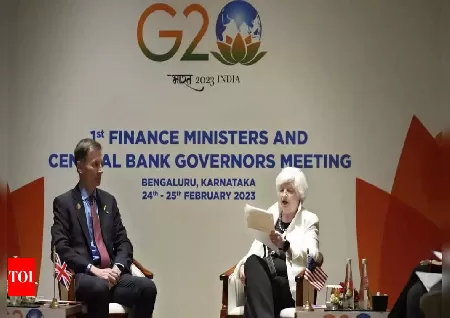G20 Finance Chiefs Fail To Draw A Consensus Over Russia-Ukraine War

Financial decision-makers from the world's largest economies clashed on Saturday about the conflict in the Ukraine and how to ease the debt load of struggling developing countries, according to attendees.There was disagreement about how to define the war in Ukraine, so the G20 meeting of finance ministers and central bankers, which was hosted by India, was expected to end without a joint communiqué later in the day. The Russian and Chinese delegations have rebuffed the demand made by the United States and its partners in the Group of Seven (G7) industrial nations that the communiqué explicitly criticise Russia for its invasion of its neighbour. In order to avoid using the terms "invasion" or "war, " Russia, a G20 member but not a G7 member, refers to its operations in Ukraine as a " special military operation.According to G20 sources who spoke to Reuters, India is pressuring the gathering to refrain from using the word "war" in any communiqué. India, which is in charge of the G20 this year, has maintained a mostly neutral attitude on the conflict, refusing to place the blame for the invasion on Russia, looking for a diplomatic settlement, and dramatically increasing its imports of Russian oil.On Thursday, when the U.N. overwhelmingly voted to demand that Moscow withdraw its soldiers from Ukraine and end hostilities, India and China were among the countries that chose to abstain. Together with the G7 nations, the G20 alliance also consists of Saudi Arabia, Australia, and Brazil. Negotiations over the communiqué were challenging, according to a senior G20 source, since China and Russia were stymieing ideas from the West. A agreement on the communiqué seemed doubtful, according to the source and many other officials, and the conference was likely to finish with a statement from the host summarising the deliberations. One insider stated, In the absence of a consensus, the alternative for India would be to release a chair statement.The ministries of information, finance, and foreign affairs of India did not immediately reply to demands for comment.
The World Bank, China, India, Saudi Arabia, and the G7 met with the International Monetary Fund (IMF) on the sidelines to discuss restructuring debt for troubled economies, but there were differences among the participants, according to IMF Managing Director Kristalina Georgieva. The resolve to overcome differences for the benefit of nations was evident during the session that just ended, according to Georgieva, who co-chaired the roundtable with Nirmala Sitharaman, the Indian Finance Minister.The largest bilateral creditor in the world, China, has been under increasing pressure from other countries to drastically reduce the amount of loans it makes to struggling poor countries. Chinese Finance Minister Liu Kun reaffirmed Beijing's stance that the World Bank and other multilateral development institutions should take haircuts alongside bilateral creditors as part of the debt reduction process. Prior to the debt summit, U.S. Treasury Secretary Janet Yellen stated that she would encourage all bilateral creditors, including China, to engage in substantive conversations about Zambia's debt and Sri Lanka's financial security.According to official figures, Zambia owed Beijing close to $6 billion of its $17 billion total external debt as of the end of 2021, while Ghana owed China $1.7 billion, according to the International Institute of Finance, a trade organisation for financial services specialising in developing countries. According to estimations by the China Africa Research Initiative think group, Sri Lanka owes Chinese lenders $7.4 billion by the end of 2022, or about a quarter of its total external debt.
Related queries to this article
- G20 Finance
- G20 Summit
- Ukraine
- Ukraine War
- G20 meeting
- Finance ministers
- Central bankers
- United States
- Russia
- Russian-Ukraine War
- Saudi Arabia
- Australia
- Brazil
- China
- India
- IMF Managing Director
- Kristalina Georgieva
- Nirmala Sitharaman
- Indian Finance Minister
- Sri Lanka
Read more articles and stories on InstaSity Latest News.





